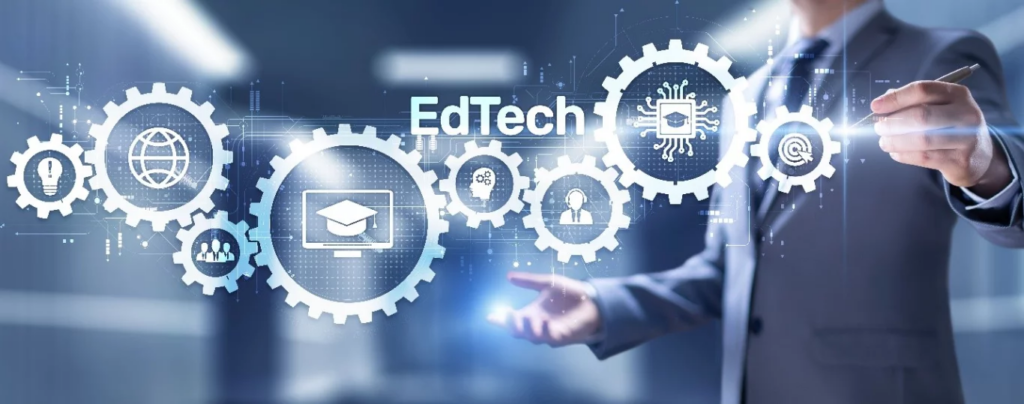The year 2023 marked a period of significant fluctuations and transformations, notably in the realm of education technology. This sector, in particular, experienced a great shift in how technology is perceived and integrated into its practices.
In 2024, educational institutions such as schools, colleges, and universities are anticipated to further embrace these technological advancements. This could lead to an increased momentum in integrating technology in educational settings.
The upcoming year is poised to be a pivotal one for education technology, with an expected increase in the utilization of online platforms for educational delivery. Different educational institutions are likely to introduce significant changes in their degree offerings. This shift will challenge conventional educational methods and pave the way for a more optimistic acceptance of online education. In this context, companies like Geniusee play a crucial role in shaping the future of education. This article will explore the potential transformations in the education sector brought about by Edtech in 2024.

Top EdTech Trends are Shaping Education in 2024
1. Generative AI in Assessments
Gone are the days when assessments were mere recollections of memorized information. 2024 witnesses the rise of Generative AI in transforming assessment methodologies. Unlike traditional testing methods, Generative AI focuses on evaluating real-world skills and problem-solving abilities. Picture a scenario where students interact with an AI bot that assesses their knowledge and skills in real-time through dynamic discussions and problem-solving exercises. This approach ensures a more comprehensive and fair evaluation of a student’s abilities, moving beyond rote learning to a more holistic assessment.
2. Personalized AI Tutors
Personalized learning has reached new heights with the advent of AI tutors. These sophisticated programs are designed to adapt to individual learning styles, providing custom-tailored assistance. Imagine students interacting with their AI tutor, “Alex,” on a tablet. Alex analyzes their study materials, engages in stimulating discussions, and customizes study sessions based on their progress. This not only makes learning more engaging but also accessible anytime, transforming the traditional tutoring model into a 24/7 personal learning experience.
3. AI in Education
AI’s role in education extends beyond assessments and tutoring. It includes a wide array of applications, from AI-powered content that provides tailored learning materials to virtual teaching assistants offering support and feedback. For instance, an AI-based system could automate the grading process, allowing educators to devote more time to student interaction and personalized teaching. This multifaceted application of AI in education streamlines administrative tasks and enhances the learning experience.

4. Virtual and Augmented Reality
The integration of VR and AR in education opens up a world of immersive learning opportunities. Students can embark on virtual field trips to historical sites or engage in interactive simulations that bring complex concepts to life. For example, a medical student might use VR to practice surgical procedures, providing a risk-free and highly realistic training environment. This technology not only enhances understanding but also adds an element of excitement to education, making learning an adventure rather than a chore.
5. Gamification
Gamification in education is not just a trend; it’s a revolution in student engagement and motivation. By incorporating game-like elements into learning modules, educators are able to make learning more enjoyable and interactive. An adaptive learning platform with gamified elements can offer personalized challenges and rewards, catering to the unique pace and interests of each student. This approach not only makes learning fun but also encourages a deeper engagement with the material.
6. Online and Blended Learning Platforms
The rise of online and blended learning platforms has been one of the most significant shifts in education. These platforms offer a blend of traditional classroom experiences with the flexibility of online learning. A student, for instance, can participate in an online discussion forum, work on group projects virtually, or access a wide range of resources online. This flexibility allows for different learning needs and schedules, making education more inclusive and adaptable.
7. Big Data in Education

Big data is reshaping how educational strategies are formulated. By analyzing vast amounts of data, educators can personalize learning experiences, identify at-risk students, and adjust teaching methodologies for better outcomes. For example, a learning management system (LMS) can track student performance and provide insights to educators, enabling them to tailor their instruction to better meet the needs of their students. This data-driven approach ensures that each student receives the attention and resources necessary for their success.
As we delve into the transformative world of EdTech trends in 2024, the opportunities for innovation and collaboration are boundless. The future of education is not just unfolding before us; it’s a canvas awaiting our collective creativity and expertise. This is where partnerships become pivotal.
Partnering with forward-thinking companies like Geniusee can help educators, institutions, and tech professionals harness these trends to their fullest potential. Together, we can create a future of education that is more adaptive, inclusive, and effective than ever before!
- What is the F-1 measure and why is it useful for imbalanced class problems?
- From Data Streams to Decentralized Worlds: Exploring the Role of Blockchain Subgraphs in Gaming Infrastructure
- How to predict customer churn using machine learning, data science and survival analysis
- Business models in data science and AI

